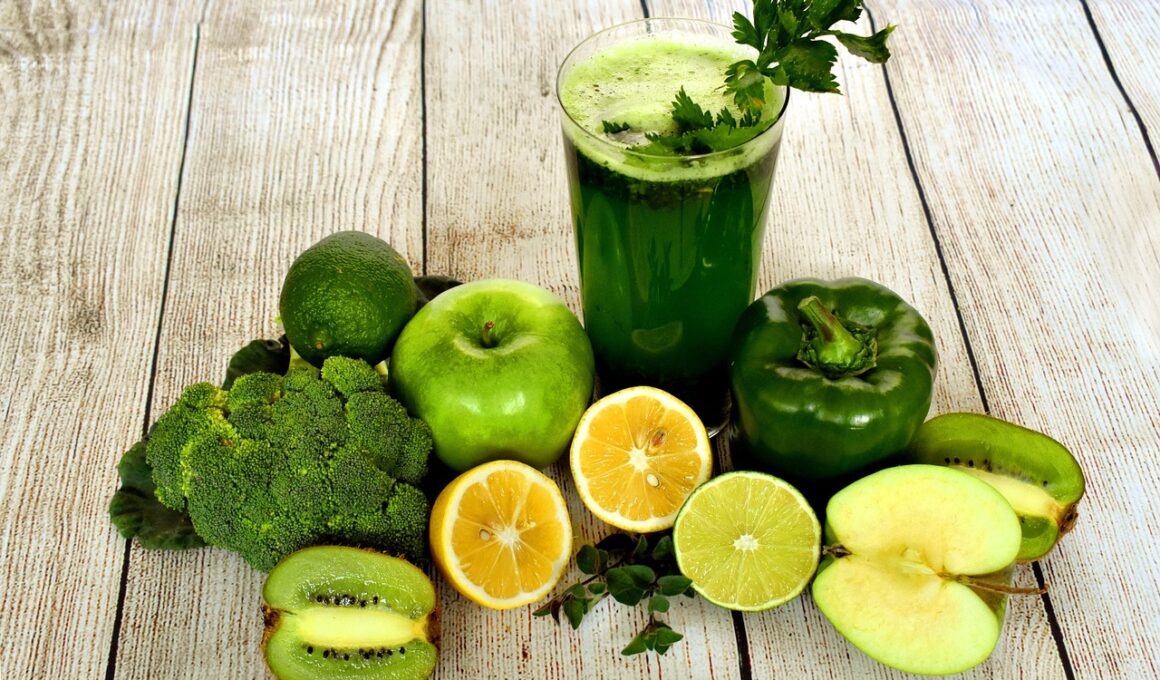Role of Antioxidants in Recovery After Home-Based Exercise
Engaging in home-based workouts is increasingly popular, providing both convenience and flexibility. However, after intense exercise, your body undergoes various stresses, leading to muscle fatigue and soreness. This is where recovery techniques become essential. Antioxidants are compounds that help mitigate oxidative stress caused by intense workouts. They combat free radicals, unstable molecules that can cause cellular damage. Consuming antioxidant-rich foods can speed up recovery, promote muscle repair, and reduce inflammation. Foods such as berries, nuts, and dark leafy greens are excellent sources. Incorporating these into your post-workout routine can enhance performance and overall health. Moreover, antioxidants contribute to improved endurance and stamina, which are crucial for regular home workouts. They support the immune system, helping to prevent illnesses that can derail your fitness goals. Additionally, antioxidants play a key role in promoting a healthier inflammatory response. Combining these nutrients with adequate hydration and rest will maximize recovery. This holistic approach not only aids physical recovery but also fosters mental well-being, ensuring that you stay motivated in your fitness journey. By prioritizing recovery, you prepare your body for future workouts.
Whether you’re training for endurance, strength, or flexibility at home, understanding recovery is paramount. Antioxidants help neutralize harmful oxidative stress from intense physical activities, allowing your muscles to recover effectively. Vitamin C and E are popular antioxidants known for their reparative qualities. Citrus fruits, like oranges and grapefruits, are rich in vitamin C, while nuts and seeds contain vitamin E. These nutrients are essential post-exercise, enhancing muscle repair and rebuilding. Additionally, certain herbs like turmeric and ginger possess powerful antioxidant effects. They are known for their anti-inflammatory benefits, which can amplify recovery post-exercise. Incorporating these herbs into your diet can create delicious recipes and aid recovery. Furthermore, green tea is a remarkable beverage in terms of antioxidant content, containing catechins that help protect cellular health. Consuming green tea can complement your post-workout routine effectively. Smoothies with spinach or kale can be another tasty option, delivering a nutritious punch to your recovery plan. Focus on maintaining a balanced diet rich in antioxidants, proteins, and complex carbohydrates for optimal recovery after workouts. These dietary choices ensure you remain energized and ready for your next home workout session.
Understanding Oxidative Stress
Oxidative stress results when there’s an imbalance between free radicals and antioxidants in the body. During exercise, especially high-intensity workouts, the body produces more free radicals. This increase can lead to cellular damage and contribute to muscle fatigue. Therefore, addressing oxidative stress post-exercise is critical for recovery. Antioxidants counteract the effects of free radicals, minimizing potential damage to cells and tissues. As you exercise, the energy demands on your muscles increase, causing metabolic reactions that generate free radicals. Continuous exposure to elevated levels of these radicals may lead to chronic issues, including muscle soreness and prolonged fatigue. Thus, elevating your intake of antioxidant-rich foods after a workout can significantly enhance your recovery process. Furthermore, the type and duration of exercise can play a role in the level of oxidative stress experienced by the body. For instance, intense or prolonged activities necessitate a higher intake of antioxidants. It’s also crucial to remember that a consistent diet rich in antioxidants over time can help improve your body’s resilience against oxidative stress, ultimately enhancing your fitness results and recovery journeys.
To effectively incorporate antioxidants into your diet, consider meal prepping. Preparing antioxidant-rich snacks and meals in advance can encourage healthy eating choices after workouts. Smoothies made with berries, spinach, and a scoop of protein powder offer a quick and nutritious recovery boost. Moreover, think about including legumes and grains, such as lentils and quinoa, in your post-workout meals. These foods not only provide antioxidants but also supply fiber and protein needed for muscle recovery. Another approach includes trying different fruits and vegetables; each type comes with unique antioxidants that support recovery. For instance, beetroots offer a nitrate boost, improving blood flow during recovery. Additionally, berries contain anthocyanins that stabilize cell membranes, aiding sore muscles after exercise. Experimenting with various recipes like salads, bowls, and smoothies can keep your post-workout meals interesting and packed with nutrients. Do not forget the importance of hydration! Including antioxidant-rich beverages like smoothies or herbal teas aids in replenishing lost fluids during workouts. Maintaining hydration is essential for optimal recovery and performance, supporting the effectiveness of your antioxidant intake.
Long-term Benefits of Antioxidants
Consuming antioxidants regularly can provide long-term health benefits beyond immediate exercise recovery. In addition to aiding in recovery, they support the immune system, reducing the likelihood of illness, especially important for home workout enthusiasts who want to remain consistent. A strong immune system keeps you energized and ensures you can continue your workouts without interruption. Additionally, antioxidants can enhance cardiovascular health by promoting healthier blood vessels and reducing inflammation. This can lead to improved endurance and performance during workouts. By protecting against oxidative stress, you also decrease your risk of chronic diseases, positively impacting your long-term health. Moreover, antioxidants may play a role in cognitive health, contributing to better focus and mental clarity during workouts. When your brain is functioning optimally, you can achieve better workout results and maintain motivation. As part of a balanced diet, antioxidants enhance your overall quality of life, enabling you to stay active and engaged in fitness activities. Adopting antioxidant-rich habits can create a solid foundation for a healthier, more active lifestyle centered around fitness and recovery.
While focusing on antioxidant intake is crucial, it’s essential to balance exercise, nutrition, and lifestyle factors. Both physical activity and diet work together in the recovery process. Engaging in restorative practices such as stretching or yoga can also improve recovery times and outcomes. These activities promote blood flow and aid in the removal of toxins from the muscles. Additionally, ensuring adequate sleep plays a significant role in recovery, as it allows the body to recharge. Recovery isn’t just about nutrition; it’s a holistic process involving body and mind. Mental health practices like mindfulness can further support recovery, helping reduce stress and enhance overall well-being. As you reflect on your workout journey, make conscious decisions about your recovery regimen to encourage sustained progress. Balancing various aspects will heighten the effectiveness of your at-home workout routines. Moreover, connecting with others who share similar fitness goals can provide motivation and accountability. Building a community around your fitness journey can enhance your experience, further encouraging adherence to recovery practices. By integrating these elements, you prepare your body for future challenges.
Conclusion
In conclusion, the role of antioxidants in recovery after home-based exercise is paramount to achieving optimal results. By smartly integrating various antioxidant sources into your diet, you actively contribute to muscle repair and overall well-being. Informed choices about post-workout nutrition can significantly improve fatigue levels, soreness, and overall energy. Complementing antioxidant intake with adequate hydration and restorative practices will enhance your recovery process. As you embark on your fitness journey, view recovery as a fundamental factor leading to continued progress. Remember that consistency is key, not just in workouts but also in post-exercise habits. Prioritizing these aspects will foster a sustainable fitness practice at home. Moreover, individuals should listen to their bodies to make informed decisions about their recovery needs. Engaging with a diverse range of antioxidant sources will help make healthy eating interesting and effective. Overall, a balanced approach that includes proper exercise, nutrition, and lifestyle choices will ensure a fulfilling and rewarding fitness journey. Embracing these principles will inspire a lifetime of health and fitness, allowing you to reach your goals from the comfort of home.


